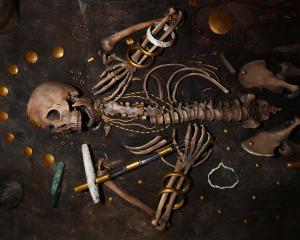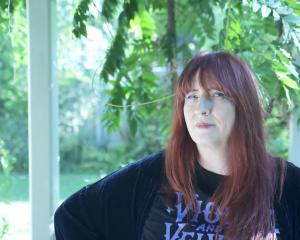
''So you actually think you can do this cartoon thing do you?'' asked the editor.
''Yes - happy to give it a go,'' I replied.
''Well ... we've decided to give you a try,'' he said.
''Send me one a week for a trial period.''
''I'd sooner send you one every day if that's OK.''
''Please yourself about that,'' he replied. ''I want to see them, not publish them. If you do the odd good one we might put one in the paper every two or three weeks, but no promises.''
And so I submitted my first cartoon to the Otago Daily Times 25 years ago today .
I had always been a cartoon fan. As a child, I had heroes like Neville Lodge and Norman Thelwell. I had long envied cartoonists ... not simply their craft and talent to amuse, but more so their opportunity to express their opinions to a wide audience.
But it seemed being an editorial cartoonist would entail moving to the city and working in a newspaper office. Unwilling to contemplate that, and content with my rural lifestyle as a landscape painter, I was resigned to never becoming a political cartoonist.
Then in 1988, in a country public bar, someone mentioned fax machines - machines that could transmit black-and-white illustrations down a telephone line with sufficient quality for them to be reproduced in newspapers.
I was astonished. Did this mean that with a fax machine and a complicit newspaper I could try my hand at this cartooning lark? In a state of excitement I set about finding out. I arranged a meeting with the then-editor and management of the ODT.
They were adamant that I would have to work in-house so they could help me with ideas. I said I did not see it working that way.
''Then how do you see it working?'', they asked.
''I come up with my own ideas and fax you a cartoon every day,'' I said.
''If you don't like it you put it in the rubbish bin - if you do like it then hopefully you'll publish it. At the end of the month I count up how many have been in the paper and send you a bill.''
''A bill? A bill? For God's sake! You want money as well? How much do you think you want?''
I mentioned a figure and that was the end of the meeting. At least I had given it a try.
Some weeks later, Geoff Adams was appointed editor and phoned to say he was keen to re-introduce cartoons to the paper. He asked where things stood. I explained that negotiations had collapsed over the money issue.
Fortunately he was tentatively prepared to find the money and did not see his ideas as being integral to the creative process. To my surprise and, no doubt, his, he published me daily from that day onward - and that despite the very first cartoon having unfortunate repercussions.
It depicted a mildly unethical car salesman at an unprecedented time when car prices were about to fall. Two of the paper's major advertisers were car companies in the city who took grave exception to the cartoon and the ODT executives spent time and money pouring oil on troubled waters.
There have been other hostile reaction to cartoons over the years, most often from special interest groups, race relations conciliators and other martyrs to political correctness.
I am frequently asked if I receive brickbats from politicians and bureaucrats who are so often the butt of my humour.
To people's surprise the answer is ''seldom''.
No doubt they are often unamused and sometimes offended but they rarely express their displeasure.
Over the years there has been feedback from MPs and their press secretaries, nearly all of it complimentary. If I have a favourite comment, it was from Pam Corkery who said: ''Love those bloody cartoons, Garrick! Keep 'em coming! I'm no racist but I'm pleased you are!''
I am so often asked ''Where do you get your ideas?''
Alas, I know of no place one can go to fetch them. The process is probably best described as controlled mind-wandering; idly rubbing thoughts together in the head until something gels.
The difficulty is in convincing the casual observer that one is hard at work when so doing. The kids would make a beeline for me when they spotted me thus engaged.
''Don't disturb your father! He's busy!'', Jill would cry.
''Busy?'', they'd wail incredulously. ''What's he doing?''
''Leave him alone,'' she'd command. ''He's trying to bring down the Government!''
Being able to work in relative isolation has been a blessing. It has spared me the help of others. Had I ever made the move to a newspaper office I suspect my cartooning career would have been short indeed.
I enjoy the platform cartooning affords me when I have something to get off my chest and the satisfaction of knowing it is reaching a large audience.
The wide readership is a consequence of demanding so little of the reader's time; brief seconds to get the cartoonist's message - many minutes to take in the journalist's.
But achieving brevity is often the biggest challenge. Kindly people contact me with what they think are cartoon ideas of great promise and take 20 minutes to explain to me a cartoon they think I should get across in 20 words or less.
Though short and succinct, the cartoon can be an effective little weapon: the ridicule provides its cutting edge and the humour leaves it, by and large, immune from counterattack.
However, I have no wish to overstate its effectiveness. I regard it as a rather negative art form. Cartoonists, like philosophers, are more adept at highlighting shortcomings than presenting solutions.
One of the constant satisfactions is the many people who take the trouble to find me and express sincere gratitude because my work has afforded them some laughter in their angst, and offered them the comfort of knowing they are not alone in their despair.












